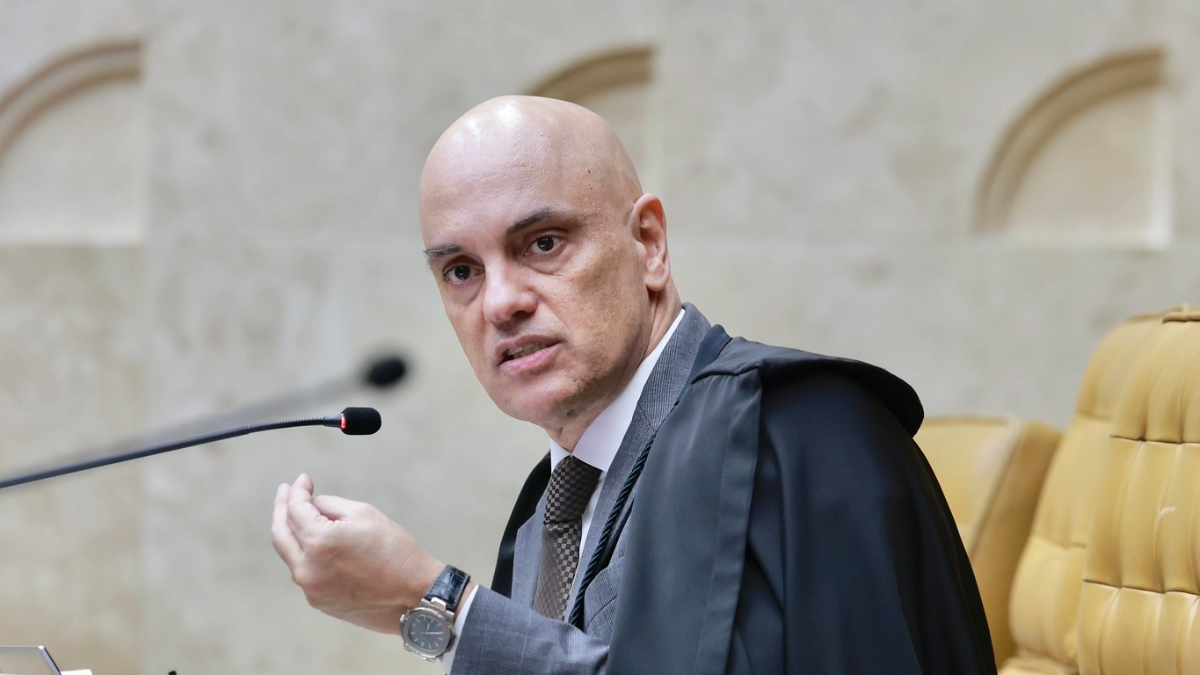Brazil’s Supreme Court Overturns Platform Liability Rules—Now Comes the Challenge of What’s Next
Laís Martins / Jun 19, 2025Laís Martins is a fellow at Tech Policy Press.

São Paulo—Brazil Supreme Court Justice Alexandre de Moraes, photographed on June 11, 2025.
In a landmark ruling last week, Brazil’s Supreme Court of Justice reached the majority of votes needed to partially declare the current platform liability regime unconstitutional, thereby ruling that social media companies could be held accountable for third-party content deemed illegal, even without court orders.
Although at first glance this could look like a positive path towards greater accountability from tech platforms, which often are not held accountable for problematic content present online, the actual outcome depends on what Supreme Court justices decide should replace the current regime.
Reaching a consensus could be a significantly more challenging task than simply acknowledging that the regime established by Brazil’s 2014 Internet Bill of Rights was insufficient, given the current threats to democracy online and other societal harms.
Brazil's 11 Supreme Court justices are tasked with finding the delicate balance between a regime that could create incentives for preventive content moderation from platforms fearing legal action and fines, one with such loose rules that it could be politically abused to suppress information and a regime that leaves platforms immune from being held accountable.
Until recently, Brazil’s platform liability regime was established by Article 19 of the 2014 bill. Similarly to Section 230 of the United States’ Communications Decency Act of 1996, Brazil’s Article 19 establishes that platforms can only be held accountable for third-party content hosted on their services if they fail to comply with a court order to remove or act upon said content.
However, in the last few years, particularly in light of repeated attacks on democracy and failure from Congress to establish a law regulating platforms, Article 19 has proven itself insufficient and outdated. The events of January 8th, 2023, when Bolsonaro supporters stormed Congress, the Supreme Court, and the presidential palace in Brasília, only accelerated a process that had been brewing for some time in the background.
Another factor to be taken into account is the renewed hostility from the United States government and allied technology companies towards the Brazilian Supreme Court. The United States Secretary of State Marco Rubio's announcement of a “Visa Restriction Policy Targeting Foreign Nationals Who Censor Americans” hinted at one specific justice: Alexandre de Moraes, who became the nemesis of US-based big tech companies after multiple decisions against them—including a block on Elon Musk’s X.
This is just another chapter in an already tense relationship. In February, Rumble and Trump Media Group, the parent company of Truth Social, sued de Moraes, accusing him of issuing orders that “require censorship of lawful content within the United States, conflicting with Plaintiffs’ First Amendment and statutory rights.”
Paulo Rená da Silva Santarém, a PhD candidate in Law, State and Constitution at the University of Brasilia, said that despite this “tug of war” between the Supreme Court and the US government on top of Brazil's own political context, justices were able to stick to the legal debate. Santarém was also the manager of the collective drafting process of the Internet Bill of Rights within the Justice Ministry.
The cases
The Supreme Court is reviewing two cases from 2017 that were eventually brought to the higher court after multiple appeals. In one of them, the constitutionality of Article 19 is questioned regarding the actions tech platforms should take regarding fake profiles that impersonate other people.
The second case, which began with a teacher who requested the removal of an Orkut community against her called “I hate Aliandra,” also tests the constitutionality of Article 19 by asking whether the platform should have removed the page even before a court order. This is considered a trickier case because it falls under defamation.
In both cases, Facebook and Google (Orkut’s owner) argued that imposing on platforms the duty of overseeing and removing third-party content posed a risk of censorship and restrictions to users’ freedom of speech.
Both cases were taken to the court’s plenary and are now considered to have “general repercussion.” That means that the outcomes will apply to other similar lawsuits at any level of Brazil’s court system and will set the precedent for future cases.
The session in which justices voted on the constitutionality of Article 19 began in December, but was suspended after one of the justices requested a review of the cases. It was then restarted in June.
On June 11th, the court reached the necessary votes to overturn the regime. Seven of the justices voted that Article 19 is partially or entirely unconstitutional, while one Justice, appointed by Bolsonaro, defended its constitutionality.
Three votes are still pending, and although they cannot change the decision, they ought to be relevant in helping justices form a consensus around what should be included in a new regime. Justice Fachin, who has yet to vote, has stated that he will take his time and introduce new ideas that his peers haven't yet proposed.
By the conclusion of the votes, it is expected that the justices will propose a new text outlining the consensus. It is unlikely, however, that this process will be concluded in the first semester, as the Supreme Court will soon go into recess.
No need to reinvent the wheel
When discussing the new liability regime, many votes suggested a mix of a new interpretation of Article 19 and another provision already included in the 2014 bill.
“What has already been established in most of the votes is that Article 19 is still valid for some situations, but there is a big divergence about which situations,” said Rená.
On one end, there are justices Fux and Toffoli, who argued Article 19 is no longer valid in any circumstance. In the middle ground, some justices defended that it could still be valid for some hypotheses, depending, for instance, on the type of internet provider. And, on the other end, there are justices Barroso and Dino, who defend that Article 19 should still be the rule for crimes against honor, including defamation and insults.
Most justices also argued for an expansion of Article 21 of the same Internet Bill of Rights. In practice, Article 21 establishes an exception to Article 19. Known popularly as the “revenge pornography” article, it establishes that platforms will be held accountable for hosting non-consensual intimate content if they fail to remove such content after being notified by the user or a legal representative.
In their votes, many of the justices defended that the “notice and takedown” liability regime entailed in article 21 should be the norm moving forward, not only for non-consensual intimate images. The big question, according to Rená, is what amplitude justices will give to Article 21.
There was one important dissent regarding the notice and takedown regime, Rená points out. Justice Barroso argued that for offenses against honor, like the teacher’s case, a notice should not be enough.
If Article 21, in fact, prevails as the new liability regime, there is a blind spot to be aware of, explained Rená. Particularly in the context of elections (Brazil will hold general elections in October 2026), the notice and takedown could be instrumentalized by politicians to sway the electoral process.
“Bolsonaro could, for example, notify social media companies to take down content saying that he planned a coup. Lula could, for instance, notify companies to take down content saying his government is unpopular, arguing that this destabilizes democracy,” said Rená, imagining examples.
“I'm not saying these two situations will happen, but we have 5,000 municipalities in Brazil, almost 30 state governments, so there are questions of political censorship by authorities that could take advantage of this provision,” he said.
“This would be the first trial by fire of this new regime that is shaping up,” he said.
Authors
